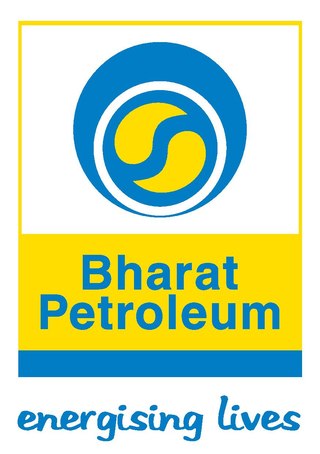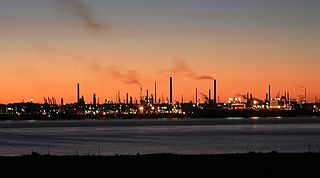Related Research Articles

Guwahati Refinery was set up at Noonmati in Guwahati on 1 January 1962. Guwahati Refinery is the first Public Sector refinery of India and belongs to Indian Oil Corporation Limited. The refinery was inaugurated by Late Pandit Jawahar Lal Nehru, the first Prime Minister of independent India. The refinery was built with Romanian Collaboration and has a capacity of 1.0 million metric tonnes per annum. This refinery process crude oil from Upper Assam Oil Fields, India and helps cater energy need of the region. Major Products of this refinery are
- LPG,
- Motor Spirit (Petrol),
- Aviation Turbine Fuel (ATF),
- Kerosene,
- High Speed Diesel,
- Light Diesel Oil and
- Raw Petroleum Coke.
Panipat Refinery is an oil refinery located in Baholi, Panipat, Haryana, India. It was set up in 1998. Panipat Refinery is the seventh refinery belonging to Indian Oil Corporation Limited. It is one of South Asia's largest integrated petrochemicals plants. Panipat Refinery meets the demand of petroleum products of Haryana and of the entire North-West Region including Punjab, J&K, Himachal, Chandigarh, Uttaranchal state and part of Rajasthan & Delhi. It stands by Indian Oil vision to become a major, diversified, transnational, integrated energy company, with national leadership and a strong environment conscience, playing national role in oil security and public distribution. Bedgsing younger of the Indian Oil refineries it houses latest refining technologies from Axens; France, Haldor-Topsoe; Denmark, UOP; USA, Stone & Webster; USA and Delta Hudson-Canada, Dupont, USA and ABB Luumas. The original cost of the refinery's construction was Rs 3868 Crores. It commenced with a capacity of 6 million tonnes per year and has been recently augmented to 12 million tonnes per year at a cost of Rs 4165 Crores. The refinery is designed to handle both indigenous and imported crudes. It receives crude through the Salaya Mathura Pipeline which also supplies crude to Mathura and Baroda refineries.
Bharat Petroleum Mumbai Refinery is a oil refinery located in Wadala East, Mumbai, India.

Chennai Petroleum Corporation Limited (CPCL), formerly known as Madras Refineries Limited (MRL), is a subsidiary of Indian Oil Corporation Limited which is under the ownership of Ministry of Petroleum and Natural Gas of the Government of India. It is headquartered in Chennai, India. It was formed as a joint venture in 1965 between the Government of India (GOI), Amoco and National Iranian Oil Company (NIOC), having a shareholding in the ratio 74%: 13%: 13% respectively. From the grassroots stage CPCL Refinery was set up with an installed capacity of 2.5 million tonnes per year in a record time of 27 months at a cost of ₹430 million (US$5.0 million) without any time or cost overrun.
The Vadinar refinery is an oil refinery at Vadinar, Gujarat, India. It is owned and operated by Nayara Energy Limited, in which Rosneft owns a 49.13% stake. The refinery is India's second largest single-location refinery, with an annual capacity of 20 million tonnes and a complexity of 11.8, which also makes it among the world's most complex refineries.

Kochi Refinery Limited (KRL) is a crude oil refinery in the city of Kochi in Kerala, India. It is the largest public sector refinery in India with a production capacity of 15.5 million tonnes per year. Formerly known as Cochin Refineries Limited and later renamed as Kochi Refineries Limited, it was acquired by Bharat Petroleum Corporation Limited in the year 2006. The refinery is situated at Ambalamugal, around 12 km (7.5 mi) east of the city centre.

Bina, formerly known as Bina-Etawa or Etawa, is a city in the Bina-etawa district of the Indian state of Madhya Pradesh. The city's name is derived from the Bina River that flows near the city.
Vadinar is small coastal town located in Devbhumi Dwarka district of the state of Gujarat, India. The offshore oil terminal of the Kandla Port Trust is located in Vadinar and contributes in a large way to the total earnings of this major port. Vadinar is now notable due to the presence of two refineries which are close by - one promoted by Reliance Industries and the other by Essar Oil Ltd. A salt production unit is located in Vadinar. The famous Narara Island, which is part of Marine National Park, is situated 7 kilometers away from town. You can also find the jellyfish, starfish, crabs, sea turtle and many endangered species over there. Two single-buoy moorings (SBM) of the Kandla Port Trust offshore oil terminal of the Indian Oil Corporation are located at this port along with a similar buoy of the Essar refinery. Indian Oil Corporation crude oil terminal is also located at Vadinar. it is secured by cisf along with KPT Port. The nearest airport is at Jamnagar 47 km away.

Bharat Petroleum Corporation Limited (BPCL) is an Indian public sector oil and gas company, headquartered in Mumbai. It is India's second-largest government-owned downstream oil producer, whose operations are overseen by the Ministry of Petroleum and Natural Gas. It operates three refineries in Bina, Kochi and Mumbai. BPCL was ranked 309th on the Fortune Global 500 list of the world's biggest corporations in 2020, and 1052nd on Forbes Global 2000 in 2023.
The Mumbai Manmad Bijwasan Pipeline (MMBPL) was one of the most ambitious projects undertaken by BPCL [Bharat Petroleum Corporation Limited]. The project commenced in mid-1998 and involved the laying of a 252 km long petroleum product pipeline from Mumbai on the Arabian sea coast to Manmad, near Nashik, located in North-Eastern Maharashtra. Subsequently, by March 2007, the pipeline was extended from Manmad to Bijwasan near New Delhi's Indira Gandhi International Airport. The total length of the MMPL pipeline, reaching from Mumbai to the outskirts of New Delhi, is approximately 1,500 km.

GAIL (India) Limited is an Indian state-owned energy corporation with primary interests in the trade, transmission and production distribution of natural gas. GAIL also has interests in the exploration and production solar and wind power, telecom and telemetry services (GAILTEL) and electricity generation. GAIL was founded as the Gas Authority of India Ltd. in August 1984 under the Ministry of Petroleum and Natural Gas to build, operate and maintain the HVJ Gas Pipeline. On 1 February 2013, the Indian government conferred GAIL with Maharatna status along with 14 other Public Sector Undertakings (PSUs).

Shell Haven was a port on the north bank of the Thames Estuary at the eastern end of Thurrock, Essex, England and then an oil refinery. The refinery closed in 1999 and the site was purchased by DP World who received planning consent in May 2007 for the new London Gateway deep water container port at the site. The neighbouring Coryton Refinery remained in operation until 2012.

Fawley Refinery is an oil refinery located at Fawley, Hampshire, England. The refinery is owned by Esso Petroleum Company Limited, a subsidiary of Exxon Mobil Corporation, which acquired the site in 1925. Situated on Southampton Water, it was rebuilt and extended in 1951 and is now the largest oil refinery in the United Kingdom, and one of the most complex refineries in Europe. With a capacity of 270,000 barrels (43,000 m3) per day, Fawley provides 20 per cent of the UK's refinery capacity. Over 2,500 people are employed at the site.

OQ, formerly known as Oman Oil Company, is an energy investment company headquartered in Muscat, Oman. It is a wholly owned subsidiary of the Government of Oman through the Oman Investment Authority state-owned enterprise.

Bina Refinery is an oil refinery located at Bina in the Bina-etawa district of Madhya Pradesh, India. It is owned and operated by Bharat Oman Refinery Limited, a wholly owned subsidiary of Bharat Petroleum Corporation Limited. As of 2013, the capacity of the refinery was 6 million metric tonnes per annum or 43,978,597.06 barrels per annum.

Indian Oil Corporation Limited, trading as IndianOil, is an Indian multinational oil and gas company under the ownership of Government of India and administrative control of the Ministry of Petroleum and Natural Gas. It is a public sector undertaking which is registered in Mumbai but headquartered in New Delhi. It is the largest government-owned oil producer in the country both in terms of capacity and revenue. It has consolidated refining capacity of 80.55MMTPA.
The Dangote Refinery is an oil refinery owned by Dangote Group that was inaugurated on 22 May 2023 in Lekki, Nigeria. When fully operational, it is expected to have the capacity to process about 650,000 barrels of crude oil per day, making it the largest single-train refinery in the world. The investment is over US$19 billion.
Pachpadra Refinery is an upcoming public sector refinery and petrochemical complex in the Pachpadra of Rajasthan, India. It is owned by HPCL Rajasthan Refinery Limited (HRRL), a joint venture between Hindustan Petroleum Corporation Limited and the Government of Rajasthan. This refinery will be connected with Jamnagar Refinery and Bathinda Refinery through Amritsar Jamnagar Expressway.
Kandla-Gorakhpur LPG pipeline (KGPL) is an under-construction gas pipeline project in India. It has a total length of 2,805 kilometres (1,743 mi) stretching from Kandla port in Gujarat to the city of Gorakhpur in Uttar Pradesh via Madhya Pradesh. The project cost is estimated to be ₹9,000-10,000 crore. It is constructed by IHB Limited, a joint venture company comprising three PSUs in India: the Indian Oil Corporation (IOCL), the Hindustan Petroleum (HPCL), and the Bharat Petroleum (BPCL). The pipeline connects refineries to liquefied petroleum gas (LPG) bottling plants.
References
- ↑ "Board of Directors". borl.in. Retrieved 5 April 2021.
- 1 2 "Privatisation-bound BPCL acquires OQ's stake in Bina refinery". Business Standard India. Press Trust of India. 31 March 2021. Retrieved 5 April 2021.
- 1 2 3 "How BPCL drafted the Bina refinery script". The Hindu Businessline. Retrieved 20 December 2012.
- ↑ "Work begins at Bina refinery". Business Standard. 10 May 2006. Retrieved 20 December 2012.
- ↑ "BPCL revises Bina refinery project cost to Rs 9,100 cr – Bharat Oman Refineries to go in for IPO". The Hindu Businessline. 25 September 2005. Retrieved 20 December 2012.
- ↑ "Manmohan dedicates Bina refinery to the nation". The Hindu. 21 May 2011. Retrieved 20 December 2012.
- ↑ "BPCL commissions 120,000 bpd Bina refinery". HT Mint. 31 January 2011. Retrieved 20 December 2012.
- ↑ "Bharat Oman shut crude unit at Bina londrefinery". HT Mint. 7 July 2010. Retrieved 20 December 2012.
- ↑ "BPCL to raise Bina refinery capacity to 9 mt". The Hindu Businessline. Retrieved 20 December 2012.
- ↑ "BPCL offers 1st naphtha export from Bina plant". HT Mint. 5 March 2012. Retrieved 20 December 2012.
- 1 2 "Bina Refinery makes Bharat proud". Archived from the original on 27 August 2011. Retrieved 20 December 2012.